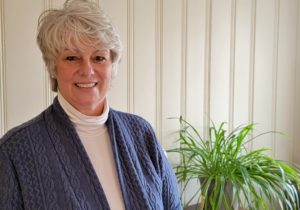
Jill Markowski joined Gifford at the start of the year. She comes to us with a very extensive background as a registered nurse and nurse educator. We wanted to get to know this native Vermonter as we welcome her to the team.
Q: Hi Jill. Thanks for taking time out of your busy schedule to help us get to know you a little better. Where did you grow up?
Jill: I was raised on the family dairy farm in Florence, Vermont.

Gifford’s new V.P. of Nursing, Jill Markowski DNP, MSA, RN, BC-NE
Q: Do you still live in Florence?
Jill: Yes. I’m still on the family farm with my show horses, donkeys and Valais Blacknose Sheep. It is currently a bit of a commute over the mountain. I am looking for a farm in the area, I just need the right property for the animals.
Q: Were you aware of Gifford growing up in Florence?
Jill: Gifford may be a smaller hospital but it is well known for its birthing center and amazing care.
Q: Why did you want to become a nurse?
Jill: When I was in middle school, my dad was involved in a farming accident. He suffered a severe brachial plexus nerve injury that left him with no sensation or movement in his arms from the shoulder down. He was a young man and sought treatment at many large medical facilities to perform nerve regeneration. Throughout this process, I was inspired by some amazing people working on those teams, trying to make someone’s life better and I thought, that’s what I want to do.
Q: Why did you decide to come to Gifford?
Jill: Nursing leadership is my passion and a colleague suggested I look into the position. I found that Gifford is a rare gem. It has loyal dedicated employees that are committed to excellent service and proud of what they do. It’s what healthcare and nursing should be about, so I was just really intrigued.
Q: And you went to high school with Gifford’s President and CEO, Dan Bennett?
Jill: Yes. Dan I both graduated from Otter Valley Union High School in Brandon. Dan is an amazing leader who understands and respects the input of his team. I knew that was the type of leader I would like to work with, so that kind of interested me. I knew what I wanted and I knew what I didn’t want. There’s a lot Gifford has to offer that other places would be thankful to have.
Q: What is your philosophy when it comes to nursing leadership?
Jill: I really believe that getting our front-line staff engaged in the care we deliver is our primary goal. They’re the ones who do it every single day, so we need to respect and appreciate what they do and have them involved in those decisions about how we can make it better. If someone sees something that could be a potential problem, I want them to feel comfortable enough to bring it forward so we can remedy that in a blame-free environment. If we can identify the issue now, then it won’t affect someone else in the future. I respect every single expert that I have on the front line. I’ve been a nurse a long time, and I lead by understanding what staff needs and then support, empower, and engage them to do it right.
Q: Can you give an example of a proud moment in your career as a leader?
Jill: I worked in critical care for many years, then the recovery room, outpatient areas in cancer centers, and case management. But my love was still with critical care. At Rutland Regional Medical Center, I started working in the progressive care unit, a step-down unit, managing a broken team. It had 95% new grad turnover with poor patient and nurse satisfaction, but we turned that team around and presented our results at National Conference. We went from the 3rd percentile to the 97th percentile. I enjoy helping teams to grow to their full potential through engaging them.
Q: Gifford is a small rural hospital that has its advantages. When you look at our providers, nurses, and staff, what do you see as Gifford’s role in healthcare in the state?
Jill: Working in healthcare is the hardest it’s ever been and we can’t continue to sustain what we’re doing. Healthcare workers are leaving the industry, because they don’t feel respected or have a voice. But that’s not the case at Gifford. Here, you’re working in a supportive environment. You have a voice and a work-life balance. You can make more money at other places, but you’re not going to have that respect. You’re just going to be a number.

